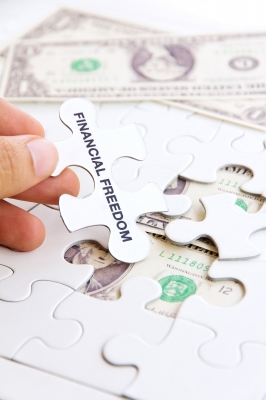
“I feel like I’m on a bad roller coaster ride and I can’t get off.”
That’s how my latest conversation started with my newest client. And while she was referring overall to the lack of financial stability in her life when she said it, when we dug deeper into the details of her financial reality she revealed that she had a significant amount of debt that she just simply couldn’t seem to ever get rid of that was at the root of her financial instability. The weight of this debt was keeping her feeling stressed and overwhelmed instead of allowing her to pursue her dreams and live a life full of freedom and choice.
Like many people that I meet, this woman was caught in what I like to refer to as the “Bermuda Triangle of Finances.” Triangle point #1 = earning a good living and making good money. Triangle point #2 = a decent amount of consumer debt (i.e. credit cards), typically on average between $20,000-$50,000. Triangle point #3 = limited, or no liquid savings at all.
It’s like the perfect storm – you work hard to earn a good living; you overspend because you aren’t fully aware of where your money goes (most people were never taught how to proactively manage their money); you accumulate debt as a result of living above your means; and you can’t ever really make a dent in your debt because every time you make a concerted effort to do so you make progress only to be interrupted by this little thing called LIFE. “Life” looks and sounds like unexpected car repairs or something unplanned for that the kids need for school or activities.
This doesn’t sound like a lot of fun, does it?
It usually isn’t much fun and almost every one of my clients show up with these symptoms and are living the reality of the Bermuda Triangle of Finances. So I’m guessing if they’re feeling this pain, you might be too.
So what to do about it? Here are 5 steps you can take today to get out of debt (and stay out of it!):
- Face the devil you don’t yet know — What do I mean by this? It’s time to face the facts and get around to documenting how much debt you really have. I know, this might be the hardest step in the whole process, but I promise that it’s really important. Without understanding the size of the problem, you can’t possibly figure out how to solve it. Grab a cup of coffee, sit down, breathe deeply, and just start writing it all down. You can keep it simple and write it on paper or use an excel worksheet. The point is just to make a full confession and get your arms around it all.
- Stabilize the chaos — When you’re beginning to develop a plan to get out of debt, it’s important to stabilize your debt balances and stop adding to them as soon as possible. Otherwise, it’s like you’re in a leaky boat with holes in it in the middle of a pond (i.e. the boat = your debt), you’re sinking and trying to bail the water out (you’re trying to pay down the debt), but at the same time you’re pouring water into your leaky boat (new purchases). The best way I know to pull up the brakes on the debt issue is to start living on cash and cash alone. If you must, keep one credit card in your wallet in case of some unforeseen challenge or emergency.
- Reassess your lifestyle — In order to get out of debt, you’ll need to free up some extra money from somewhere to start paying it down. The best way to do that it to see where you may be overspending. Overspending can happen in small doses (i.e. eating out a lot, clothes shopping, etc.), or with bigger purchases (i.e. a high rate on a mortgage, private school tuition, etc.). No one likes change, I know – however in order to solve the debt puzzle it’s very important to see what changes you can make in how you live your life to contribute extra money toward paying down debt. In the end, you’re looking to find a certain amount of money each month that you can dedicate toward paying down your debt.
- Develop a strategy to pay down your debt — After writing all of your debt down, it’s important to come up with a strategy to pay it down. I usually recommend that as the first step in developing your strategy that you “rank” your debt and decide which piece you’ll pay down first. The game plan is to pay at least the minimums on all pieces of debt and to focus any extra money you have on one piece and one piece only until it’s paid off. This plan makes it much easier to focus and you’re consistently seeing the reduction of your debt until the one piece is gone. After the first piece of debt is paid off, then you move on to the second piece, and so on and so forth until you’re done paying off all of your debt!
- Save your way out of debt — This is an often-missed piece of the puzzle and what I’m about to say may be viewed as heresy. Most people believe that if they have debt they should use any extra money they have to be responsible and pay down the debt. WRONG. In my experience with clients living in the “Bermuda Triangle of Finances,” there’s a delicate balance between being responsible and strengthening your financial foundation (i.e. savings). Life is always going to happen and you can’t plan for everything. With that in mind, it’s important that while you’re working a plan to pay off your debt that you’re also saving. Why you might ask? Because if you save as you’re paying off debt, eventually when something unexpected happens you’ll be more likely to have the cash to pay for it and you won’t have to add it to your debt and interrupt the process of paying down your debt. So take a portion of the extra money that you found in reducing your expenses and allocate it toward savings. I generally recommend that until you reach a savings balance equal to one month’s worth of expenses that you dedicate a portion of the extra money to savings and a portion toward debt.
And while the 5 steps above will help you systematically design an effective plan for getting out of debt, there’s also the emotional part of paying down debt to consider as well. Do not, under any circumstances, start depriving yourself of everything fun and good in your life! This will backfire every time, as eventually you’ll begin to resent your plan and you’ll sabotage your progress. Yes, it’s important to reassess your spending but don’t start living like a pauper all of a sudden!
Money management isn’t always sexy (unless you’re me and love it!), but taking things one step at a time is what it takes to work your way off the debt roller coaster and from potentially getting yourself in an even more stressful financial situation.
Image courtesy of Ponsulak / FreeDigitalPhotos.net






